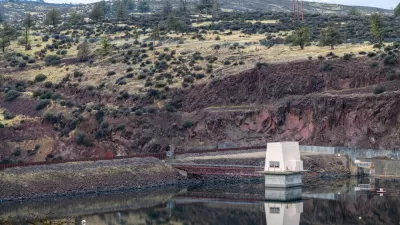There might not be a drawing board to go back to after an agreement that would have removed four dams along the Klamath River died in Congress.
Bettina Boxhall reports on the fall out following the demise of an agreement that would have settled a decades-long debate on the Klamath River in California. "The complicated pact, backed by the states of California and Oregon, called for the removal of four hydroelectric dams, settled water rights disputes and spelled out water allocations for irrigators and wildlife refuges in the Klamath Basin," according to Boxhall. But the agreement expired "when Congress failed to approve it by Dec. 31."
The deal managed a rare and difficult to duplicate local negotiation, but failed to gain support from Republicans in Congress. According to Boxhall, the conflict "embodies classic struggles over western water":
Tribes, farmers, hydropower interests and commercial fishermen all have fought over the 255-mile river, which winds from southern Oregon through Northern California to the Pacific Ocean. Dams, farm and ranch diversions and agricultural runoff have exacted a heavy toll on a waterway that once supported Chinook salmon runs half a million strong.
The article includes a lot of detail of the complicated politics of the agreement, as well as any future prospects for a revived agreement.
FULL STORY: Demise of Klamath River deal could rekindle old water-use battles

Alabama: Trump Terminates Settlements for Black Communities Harmed By Raw Sewage
Trump deemed the landmark civil rights agreement “illegal DEI and environmental justice policy.”

Planetizen Federal Action Tracker
A weekly monitor of how Trump’s orders and actions are impacting planners and planning in America.

Why Should We Subsidize Public Transportation?
Many public transit agencies face financial stress due to rising costs, declining fare revenue, and declining subsidies. Transit advocates must provide a strong business case for increasing public transit funding.

Understanding Road Diets
An explainer from Momentum highlights the advantages of reducing vehicle lanes in favor of more bike, transit, and pedestrian infrastructure.

New California Law Regulates Warehouse Pollution
A new law tightens building and emissions regulations for large distribution warehouses to mitigate air pollution and traffic in surrounding communities.

Phoenix Announces Opening Date for Light Rail Extension
The South Central extension will connect South Phoenix to downtown and other major hubs starting on June 7.
Urban Design for Planners 1: Software Tools
This six-course series explores essential urban design concepts using open source software and equips planners with the tools they need to participate fully in the urban design process.
Planning for Universal Design
Learn the tools for implementing Universal Design in planning regulations.
Caltrans
Smith Gee Studio
Institute for Housing and Urban Development Studies (IHS)
City of Grandview
Harvard GSD Executive Education
Toledo-Lucas County Plan Commissions
Salt Lake City
NYU Wagner Graduate School of Public Service



























